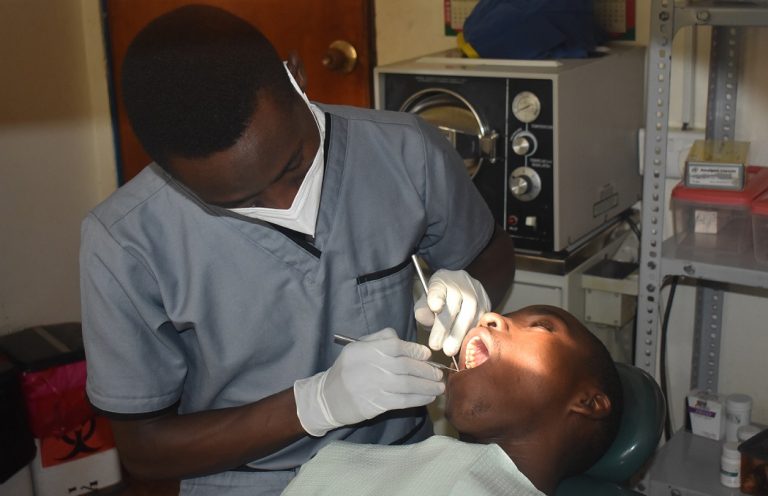According to the World Health Organization (WHO), dental caries is a pathological process that leads to enamel decalcification, the breakdown of dental hard tissues, and the formation of dental cavities.
Cavities are permanently damaged areas in the hard surface of the teeth that develop into tiny openings or holes.
Causes of dental caries
Dental caries are caused by a combination of factors i.e.
- Bacteria in the mouth (Streptococcus mutants and streptococcus bring).
- Frequent snacking
- Not cleaning your teeth well
- Susceptibility
Anyone with teeth can suffer from dental caries but dental caries are most common in;
- Children
- Teenagers
- Older adults
Symptoms and signs of dental caries
- Brown, black or chalky white staining on any surface of the tooth
- Visible holes or pits in your teeth
- Pain when you bite down
- Mild to sharp pain when eating or drinking something sweet, cold or hot
- Tooth ache, spontaneous pain or pain that occurs without any apparent cause
Risk factors
Everyone with teeth is at risk of getting cavities, but the following factors can increase the risk:
Tooth location; posterior teeth (molars) are most affected because they have pits, fissures, grooves, crannies; these make them hard to clean unlike the anterior teeth which can easily be cleaned.
Certain food and drinks: sugary foods such as cake, cookies, honey, dry cereals, candy mints, drinks like ice cream, milk are more likely to cause decay to your teeth
Frequent snacking or supping: when you regularly eat snacks or colas, you give mouth-bacteria more energy to attack your teeth and wear them down.
Inadequate brushing: if you don’t clean your teeth soon after eating and drinking, plaque forms quickly and the first stage of decay can start
Not getting enough fluoride: Fluoride prevents cavities and also help to reverse the earliest stages of tooth damage. It’s for these benefits that fluoride is added to many public water supplies, tooth paste and mouth rinses
Younger and older age: Children and teenagers easily suffer from dental caries. Older adults are also at risk because teeth wear, gums recede making teeth more vulnerable to root decay. Older adults also use medication that reduce saliva flow hence increasing the risk of tooth decay
Dry mouth: this is caused by lack of saliva which helps to prevent tooth decay by washing away food and plaque from the teeth. Certain medications, medical conditions, radiation to head and neck and some chemotherapy drugs can increase your risk of cavities by reducing saliva production
Heart burn: Gastroesophageal reflux diseases (GERD) can cause stomach acid to flow into your mouth (reflux) wearing away the enamel of your teeth and causing significant tooth damage
Eating disorders: Anorexia and bulimia can lead to significant tooth erosion and cavities. Stomach acid from repeated vomiting (purging) washed over the teeth and begin dissolving the enamel. Eating disorders can also interfere with saliva production
Cavities and caries are so common that people do not take them serious, however, cavities and decay have serious lasting complications even for children who don’t have their permanent teeth yet, these include;
- Pain
- Tooth abscess
- Swelling or pus around a tooth
- Damage or broken teeth
- Chewing problems
- Shifting of the teeth position after the tooth loss
- Weight loss or nutrition problems from painful or difficulty in eating or chewing
- Low self-esteem as a result of tooth loss which affects your appearance
For abscess, a pus pocket filled with bacteria can lead to more serious and life threatening infections
Prevention
- Brush regularly with fluoride tooth paste after eating or drinking. Ideally, its paramount to brush after eating every meal, it’s also important to use a floss to clean between teeth.
- Rinse your mouth using a mouth rinse or warm saline rinse as recommended by a dentist, this reduces the risks of caries
- Visit your dentist regularly, get professional teeth cleanings and regular oral exams which can help prevent problems or identify them as early as possible
- Consider dental sealants. A sealant is a protective plastic coating applied to the chewing surface of back teeth. It protects the enamel from plaque and acid. Sealants last for years but need to be checked regularly.
- Avoid frequent eating of snacks. Learn to limit snacks and sips to meal time
- Eat tooth healthy food such as fresh fruits, vegetables, to increase saliva flow, sugar-free gums, unsweetened coffee and tea helps wash away food particles
- Consider fluoride treatment
- Ask about antibacterial treatment






